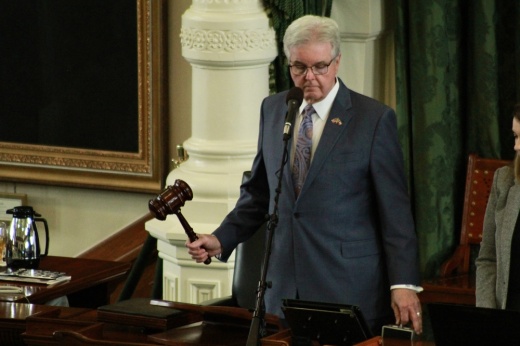Senate Bill 15, filed by Sen. Mayes Middleton, R-Galveston, requires college students to compete on sports teams based on their sex assigned at birth, regardless of their gender identity. If the bill becomes law, transgender women would not be able to join women’s sports teams, and transgender men would not be able to join men’s sports teams.
During the 2021 legislative session, lawmakers made the same changes to K-12 sports with House Bill 25, which went into effect in January 2022.
State senators approved SB 15 with a 19-12 vote. The bill now heads to the Texas House, where Republican lawmakers have expressed their support for similar legislation. HB 23, by Rep. Valoree Swanson, R-Spring, has been co-signed by over half of the 150-member House. It is currently in the House Committee on State Affairs and has not yet reached the House floor.
Middleton’s bill has been deemed the “Save Women’s Sports Act.” In the Senate chamber, Middleton said the bill would increase fairness in college sports.
“If Congress won’t stand for fairness, if our Department of Education won’t stand for fairness, if the NCAA won’t stand for fairness in women’s sports, then the Texas Senate will,” he said.
The bill “addresses the inherent unfairness of biological males competing against biological females in competitive collegiate level athletics by banning athletes from competing on the team opposite of their biological sex,” Middleton wrote in an analysis of his legislation.
But LGBTQ+ advocates say the bill discriminates against transgender athletes, rather than leveling the playing field. Ash Hall, the policy and advocacy strategist on LGBTQ+ rights for the ACLU of Texas, said transgender women do not have a biological advantage over their opponents and teammates.
“Many [transgender women] are on hormones, and the goal of that hormone therapy is generally to give them hormone levels that are comparable to cisgender women,” Hall said.
Hall said athletes who are particularly tall, can build muscle more quickly than their peers or have body types that cater to the sports they play may have a biological advantage.
“But we don’t punish those athletes,” they said. “We’re only punishing trans women, regardless of how their bodies compare to cisgender women.”
Sen. Sarah Eckhardt, D-Austin, spoke in opposition to the bill before the chamber’s vote March 29.
“We are hounding an already bullied class of Texas young people,” Eckhardt said. “Trans athletes in collegiate competitions are rare. When they do seek to compete, the NCAA has already exhibited and will continue to exhibit the expertise to level the playing field on a case-by-case basis.”
The bill is among the priorities of Lt. Gov. Dan Patrick, who leads the Texas Senate. Gov. Greg Abbott has also expressed support for this type of legislation.
“[SB 15] is part of a broader national coordinated campaign to target transgender people for the benefit of a select few organizations and politicians,” Hall said. "My hope is that, especially in Texas, Texans will come out and prove together that we care for everybody; we care for our neighbors, regardless of how they identify.”





